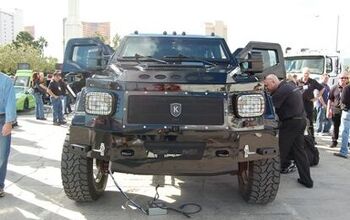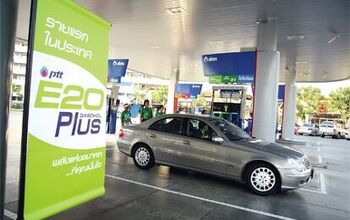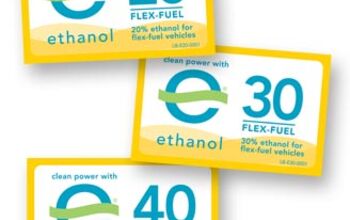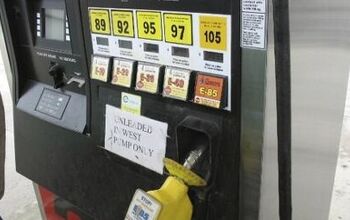E85 Boondoggle of the Day: Water, Water, Everywhere
Two recent developments have tarnished whatever green reputation ethanol has left. First, the news that corn-derived ethanol requires up to three times more water to produce than previously thought has cast a spotlight on the industry, especially in the dry west and southwest. A new study published by the American Chemical Society reports that previous estimates of water used to produce ethanol are inaccurate. The article’s abstract:
Prior studies have estimated that a liter of bioethanol requires 263−784 L of water from corn farm to fuel pump, but these estimates have failed to account for the widely varied regional irrigation practices. By using regional time-series agricultural and ethanol production data in the U.S., this paper estimates the state-level field-to-pump water requirement of bioethanol across the nation. The results indicate that bioethanol’s water requirements can range from 5 to 2138 L per liter of ethanol depending on regional irrigation practices. The results also show that as the ethanol industry expands to areas that apply more irrigated water than others, consumptive water appropriation by bioethanol in the U.S. has increased 246% from 1.9 to 6.1 trillion liters between 2005 and 2008, whereas U.S. bioethanol production has increased only 133% from 15 to 34 billion liters during the same period. The results highlight the need to take regional specifics into account when implementing biofuel mandates.
A common theme in the adoption of green practices is sustainability. As the authors state, the onus on the mandate-makers will be to determine if the the true cost of ethanol is worth more than the water used to produce it. In California, water is liquid gold.
For now, this may all be for naught. The second development is a one-two punch to the ethanol industry: the collapse of fuel consumption and the evaporation of business credit have left scores of ethanol plants high and dry. Sacramento-based Pacific Ethanol—who built three plants in three states and were once the darling of the industry, attracting investment from Bill Gates and the former Secretary of State of California—recently defaulted on a $250 million loan. Gates has dumped most of his shares which now trade at less than fifty cents on NASDAQ; and, in a further blow, rising corn prices threaten to squeeze what margin they have.
In an ironic twist, Big Ethanol’s savior may come in the form of Big Oil. The New York Times reports that Valero, the country’s largest independent refiner, is paying nearly $500 million for seven VeraSun ethanol plants. VeraSun filed for bankruptcy protection last fall. “It’s a good deal for Valero because they have to have ethanol in their blend mandated by the federal government,” said an energy analyst. “Ethanol is still a lousy business, but if you can buy the plants for cents on the dollar, it looks a lot better as Washington is likely to keep mandated production targets.”
Chevron (and Exxon), at 13+ times the capitalization of Valero, is sitting on a hoard of cash accumulated in the epic run up of oil on the markets. They can (and will) wait for more ethanol start ups to die off and, like pigs, gorge themselves on corn.
Early 30s California guy driving a 97 Infiniti I30. Past cars: 90 Cavalier, 82 Skylark, 78 Courier, 61 Beetle.
More by Jeff Puthuff
Latest Car Reviews
Read moreLatest Product Reviews
Read moreRecent Comments
- Marcr My wife and I mostly work from home (or use public transit), the kid is grown, and we no longer do road trips of more than 150 miles or so. Our one car mostly gets used for local errands and the occasional airport pickup. The first non-Tesla, non-Mini, non-Fiat, non-Kia/Hyundai, non-GM (I do have my biases) small fun-to-drive hatchback EV with 200+ mile range, instrument display behind the wheel where it belongs and actual knobs for oft-used functions for under $35K will get our money. What we really want is a proper 21st century equivalent of the original Honda Civic. The Volvo EX30 is close and may end up being the compromise choice.
- Mebgardner I test drove a 2023 2.5 Rav4 last year. I passed on it because it was a very noisy interior, and handled poorly on uneven pavement (filled potholes), which Tucson has many. Very little acoustic padding mean you talk loudly above 55 mph. The forums were also talking about how the roof leaks from not properly sealed roof rack holes, and door windows leaking into the lower door interior. I did not stick around to find out if all that was true. No talk about engine troubles though, this is new info to me.
- Dave Holzman '08 Civic (stick) that I bought used 1/31/12 with 35k on the clock. Now at 159k.It runs as nicely as it did when I bought it. I love the feel of the car. The most expensive replacement was the AC compressor, I think, but something to do with the AC that went at 80k and cost $1300 to replace. It's had more stuff replaced than I expected, but not enough to make me want to ditch a car that I truly enjoy driving.
- ToolGuy Let's review: I am a poor unsuccessful loser. Any car company which introduced an EV which I could afford would earn my contempt. Of course I would buy it, but I wouldn't respect them. 😉
- ToolGuy Correct answer is the one that isn't a Honda.


































Comments
Join the conversation
And now with the high price of fertilizer the farmers are switching to soybeans. Could be a big corn shortage. How does the government think up so many stupid ideas? Lucky for them they are using other peoples money and not their own.